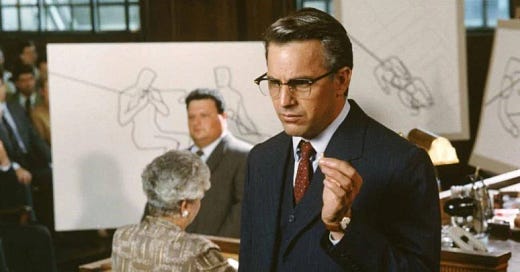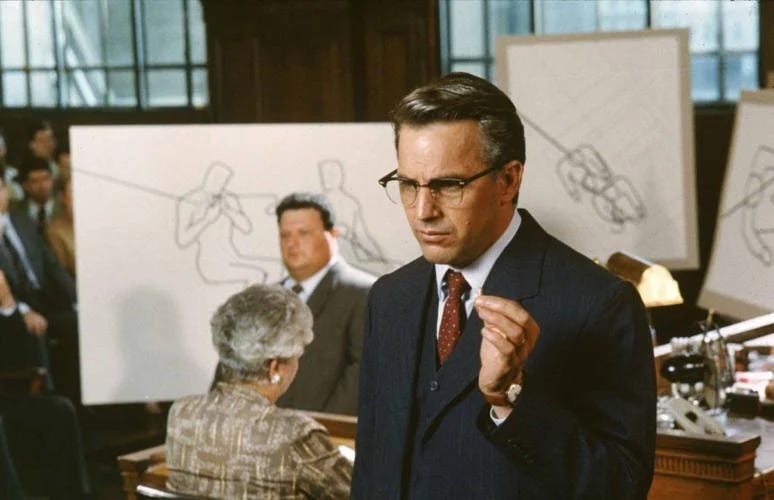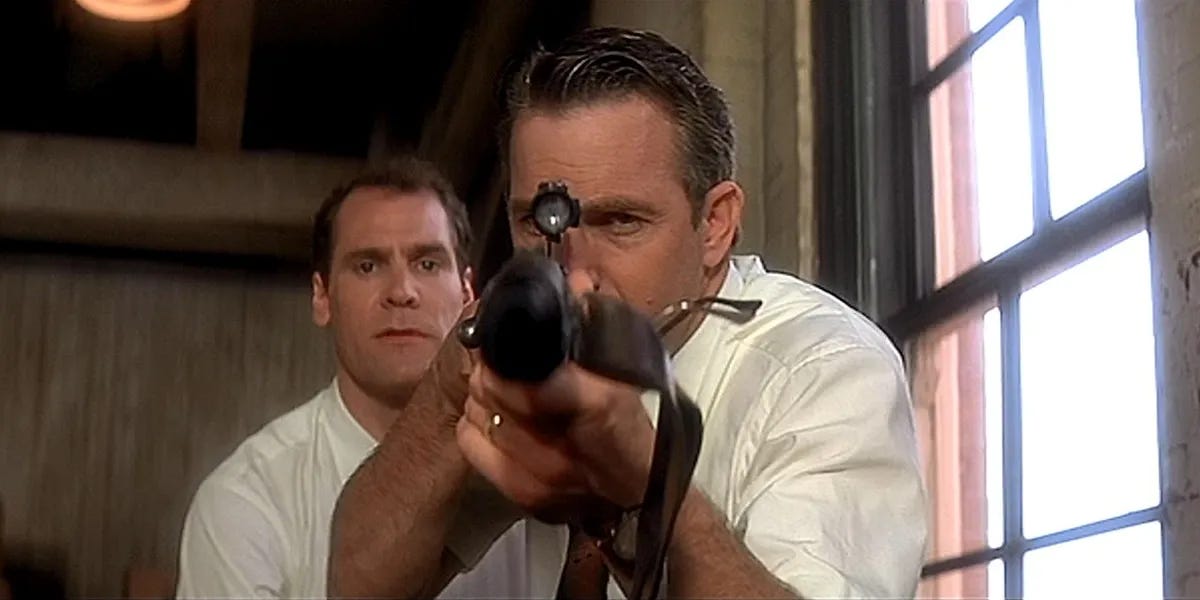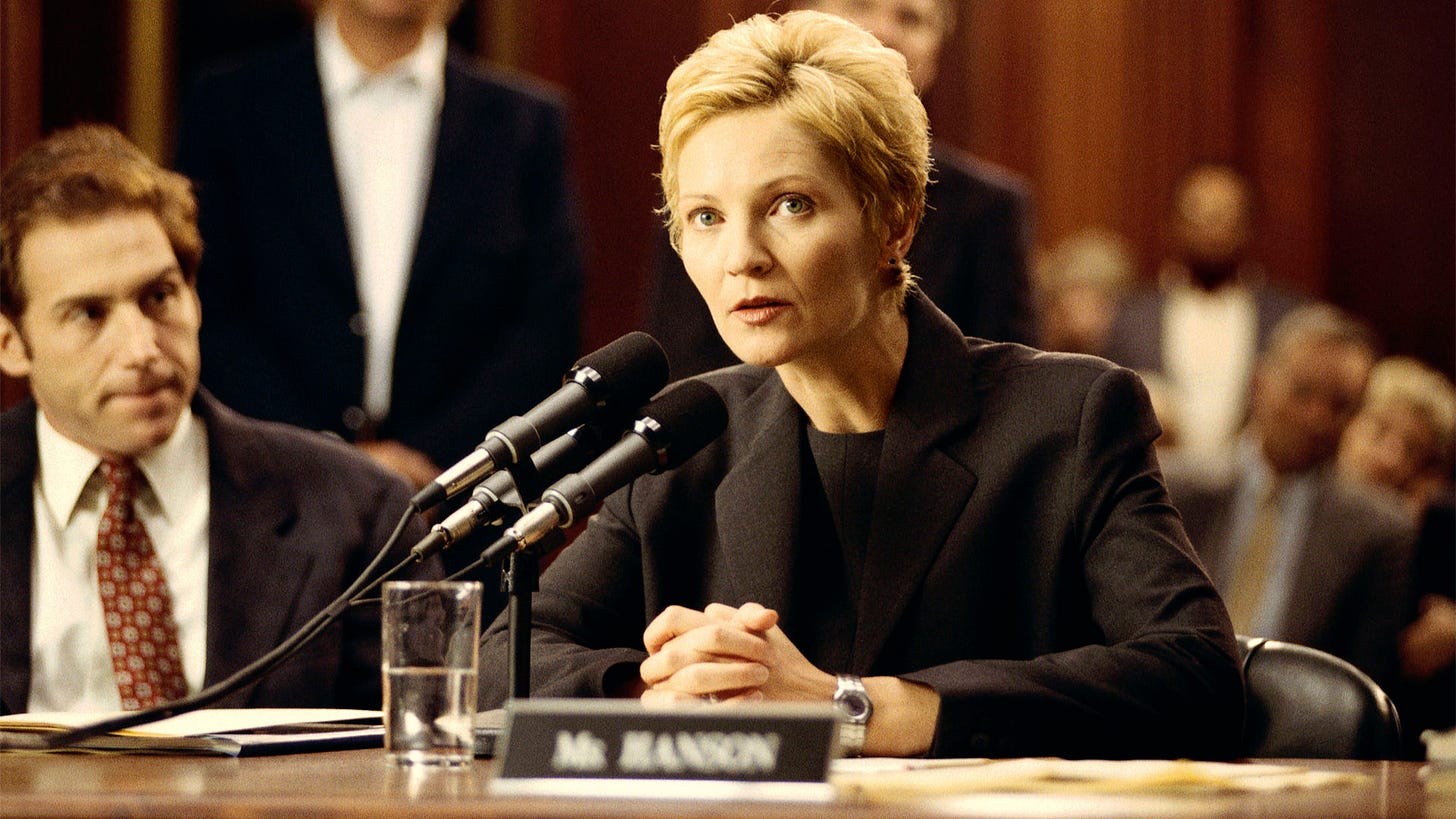JFK: The end of the innocence
"You all got to start thinking a different level - like the CIA does. Now, we're through the looking glass here, people. White is black, and black is white."
Obsessions die hard in America. But it’s entirely possible that the grip the Kennedys once held on the public consciousness has finally loosened after almost 70 years of glamorizing a political dynasty whose aura always outshone its achievements. To older Democrats, Robert F. Kennedy Jr’.s heel turn and embrace of Donald Trump may have been the final straw, while to younger ones, Jack, Bobby, Teddy, Ethel and the gang are shadows, blurry vestiges of an ever-fading past.
I was young enough, growing up in the 70s and 80s, to still be captured by the mythology that sprung up around the family. The tragedies still seemed recent, the media attention almost eternal. I watched Jackie cavort with a Greek tycoon and John-John grow up. Every Democrat with a decent head of hair (Where have you gone, Gary Hart?) seemed to be offered up as an ersatz version of the dead president.
Jackie became a New York book editor, John Jr. perished, Teddy missed his moment, got old, and the next generation failed to carry the ball. The Kennedy allure took a back seat to first Bill Clinton and later, Barack Obama, fresher generational updates. And as societal standards shifted, the antics of the Kennedy boys became, in retrospect, more fratty than fashionable. (Although when I attended my first White House Christmas Party, there was only one presidential portrait I was particularly interested in seeing first-hand.)
JFK is as distant to today’s voters as Grover Cleveland was to those who cast their votes in 1960. So it has become harder to explain to someone like my daughter how John Kennedy’s assassination was a singular moment in history, a day that those who experienced it kept in their minds and hearts for the rest of their lives. The country had lost presidents before to a gunman’s bullet, but not like this. Not so publicly. Not on television. And not at a time where there seemed to be so much riding on this one vigorous man who had been elected to combat the Soviet Union, safeguard the nation from nuclear war, advance civil rights and catapult us into the future. The tragedy of that day gave way soon to the loss of MLK, then RFK. I’m not sure we can appreciate the sense of madness that pervaded then; it was as if the world tipped over. The New Frontier and all the promise it stood for had been wiped away, and in its place was a winter of discord and mistrust. John Kennedy’s death, Oliver Stone said, “changed the course of this country . . . for all time.”
And Stone being Stone, he had to make a movie about it.
An obsessive filmmaker, Stone found his ideal subject in the assassination, which remains one of the most analyzed and discussed events in history, one dissected in novels by Don DeLillo and Stephen King, detailed in endless tomes embracing or debunking the alleged conspiracies, dramatized on “Mad Men”1 and parodied in Annie Hall and on “Seinfeld.” Now, more than 60 years later, the subject still fascinates. Ask Chat GPT if Lee Harvey Oswald killed Kennedy and you’ll get an extended answer. But it won’t include the word, “Yes.” Even the robots aren’t sure.
Stone’s obsessions revolve around the exercise of power, be it state or corporate, and its potential for subversion and corruption. He is a true, artistic child of JFK, Vietnam (where he served) and Watergate, more so than his contemporaries such as Scorsese or Spielberg, big-deal directors who largely avoided movies about politics. Stone didn’t dodge controversy. He courted it. His first film, Salvador, was a lacerating look at Reagan-era foreign policy in Central America. He followed that up with close-up studies of Vietnam (Platoon) and predatory capitalism (Wall Street), which made him, for a time, the hottest filmmaker working.
What he was not was subtle. JFK is in turns, a lament, a fever dream, a Cold War thriller, a documentary, a courtroom drama, a whodunnit and an angry middle finger directed at the political establishment. It is a testament to Stone’s prowess—and the ceaseless interest in JFK’s death – that a 188-minute film that largely features people talking in smoke-filled rooms made $205 million at the box office and was nominated for eight Academy Awards, including Best Picture. It was the Oppenheimer of its day.
JFK opens with President Eisenhower’s famous warning about the rise of the military-industrial complex – the key to unlocking the film. From there, it isn’t long before we’re in Dallas on Nov. 22, 1963. Kennedy himself is not a character in the film; he’s barely present. And there is little examination of his presidency, other than the suggestion that the CIA and anti-Castro Cubans were unhappy with how the 1961 Bay of Pigs operation went down. There are noises that Kennedy has struck a deal with the U.S.S.R. that will keep Castro in power but avoid further incidents such as the Cuban Missile Crisis. The president is also said to have misgivings about the U.S. role in Southeast Asia.
Indeed, Kennedy’s decision to travel to Texas is viewed as an unwarranted venture into enemy territory. (Presidents rarely travel to unfriendly states then and now.) There are handbills demanding his arrest for treason – a reminder that our polarized society didn’t spring up in the last 10 or 20 years but has always been a part of our experience. In the wake of his murder, we witness some observers following the coverage on TV cheer. “I’m ashamed to be an American today,” says Jim Garrison, watching from New Orleans, where he serves as district attorney.
Garrison is Stone’s point of entry into the story. He’s our movie detective, piecing together clues about a possible Louisiana-based conspiracy that may, or may not, involve the CIA, Cuban militants, the mafia, Oswald and local businessman Clay Shaw. Garrison goes unpersuaded by the report delivered by the Warren Commission that concludes Oswald acted alone – to the extent that he and his team attempt to re-create the shooting themselves. He travels to Washington, where a covert operative who calls himself X spins a tale of a series of decisions made at the highest levels of government that suggests Kennedy was set up to be murdered.
The movie’s final act involves Garrison’s prosecution of Shaw, where he is given – in highly cinematic fashion – an opportunity to outline his argument for the jury and for us in the audience. Kennedy, he contends, was the victim of nothing less than a coup d’etat engineered by a conservative cabal that worried he was going to scale back the U.S. presence in Vietnam, a move that could cost defense contractors billions. It’s Stone’s Mr. Smith Goes to Washington moment, where our protagonist exposes the depth of corruption in government. And it’s Stone’s attempt to establish reasonable doubt in our minds of what happened on that November day. “Do not forget your dying king,” an overcome Garrison tells the jury, quoting Tennyson.
As a piece of entertainment, the film works like the taut big-budget studio thriller it appears to be. Stone employs a bevy of tricks to hold our attention – close ups, narrations, quick cuts, differing film stocks and color grades. He mixes real news footage with his own fake re-creations. The technique amplifies the sense of uncertainty, a swirl of facts and half-truths and overbaked theories, mixed together and provided at a velocity that makes it difficult to separate fact from fiction. That, of course, was by design.
As Garrison, Kevin Costner plays an even more driven lawman character than the straight-arrow he portrayed in The Untouchables. The difference is that DePalma’s film ends on an uplifting note. There is no Capone to bring down in JFK. Shaw goes free. (That’s not a spoiler; there has never been a successful prosecution connected to Kennedy’s death. The truth apparently died with Oswald -- and recently declassified documents failed to shed much new light.) Costner brings the right amount of Gregory Peck-style idealism to the role, even if he was a bit young for the part. His summary monologue is one of the finest moments in his long career. In reality, Garrison was viewed by many as a loose cannon, forever chasing strawmen. Stone could be seen the same way.
Costner is backed by a lineup of all-stars who were eager to work with Stone including Gary Oldman as Oswald and Tommy Lee Jones as Shaw. Joe Pesci is particularly effective as the squirrelly David Ferrie, who may or may not have been a CIA contractor. With his wig and false eyebrows (the real Ferrie suffered from alopecia), Pesci is all chain-smoking nervous energy. To him, the monstrousness of the crime ensures no one will ever be held accountable. It’s too large. The cast also includes Sissy Spacek, Jack Lemmon, Walter Matthau, Kevin Bacon, John Candy, Michael Rooker and, as X, Donald Sutherland, who slinks into and out of the picture and might as well be a proxy for Stone himself.
To critics, Stone’s film was the devil’s candy, a package of propaganda assembled by a master huckster. JFK was savaged in some circles before it was ever released, proof to Stone that he was on to something. The timing could not have been better. In the film, when Garrison suggests there may be a “rogue element” at work in the government, he is mocked as a deranged conspiracist. But in 1991, when the film was released, the nation was just a few years removed from the Iran-Contra affair in which, if the facts as presented were to be believed, a rogue element within the National Security Council covertly arranged for arms to be sold to Iran to fund freedom fighters in Nicaragua, actions that had been expressly prohibited by Congress. Stone could hardly have found a better Exhibit A for his worldview.
But even before then, the public’s belief in the initial narrative around Kennedy’s death had become colored by subsequent events such as the expansion of the Vietnam War and Nixon’s actions with regard to Watergate. In the time of the Warren Commission report, the government arguably held more credibility with the American people. A decade of institutional lies and misdirection eroded that trust and radically altered the public’s perception of its elected leaders. Ultimately, it was determined that members of the commission sought to preserve the reputations of the CIA and FBI and spare the agencies any blame for Kennedy’s death. A 1978 report from the House Select Committee on Assassinations concluded that it was likely there was a second shooter that day in Dallas, although that report, too, was later discredited. 2
If Kennedy’s death ushered a new era of conspiracy theories, one pockmarked by UFO abduction claims, and Bermuda Triangle tales, then Stone’s film took things a step further. It presaged our current “post-fact” culture in which people form their own narratives based on subjective evidence. The tools he used as a master craftsman have now been superseded by social media, AI and deepfakes, which allow for the full-stop distortion of events and the manipulation of truth by just about anyone. To me, that is the film’s legacy. It anticipated the collapse of gatekeepers and the fall of the established media. There are no somber, sad-eyed Cronkites anymore who will remove their glasses on live TV, give it to us straight and assure us what we are being told is real. You are permitted to walk away from the film believing exactly what you wish to believe.
Is that dangerous or democratic? I think I know Stone’s answer. I’m not sure about mine.
WHERE TO WATCH IT: JFK streams on all major platforms.
HEY ISN’T THAT: This is a movie filled with memorable cameos, so you can take your pick. There’s “Seinfeld’s” Wayne Knight and “Roseanne’s” Laurie Metcalf as members of Garrison’s team and Brian-Doyle Murray (Bill’s brother) as Jack Ruby. But the ultimate cameo is from Garrison himself. He plays Earl Warren.
ARMAGEDDON INDEX (5/10): It depends on your definition, but to the credit of the nation, there was a quick, uneventful transfer of power to Lyndon Johnson after the assassination. Continuity of government was preserved.
DUST CLOUDS: Kennedy famously distrusted the CIA after the Bay of Pigs fiasco (it’s almost always referred to as a “fiasco”), an operation he inherited from the Eisenhower administration. He blamed CIA Director Allen Dulles, whom he felt had grown too powerful, and other officials for misleading him about the plan’s chances for success—and pushed them out of office. Dulles was later appointed to the Warren Commission by Johnson and used that perch to protect the agency’s interests during the probe.
Incidentally, I lived in Miami for three years and can attest that the antipathy among some in the Cuban exile community toward Kennedy was real. He was blamed for not doing more to support the invasion force. Some historians have cited this as a reason why Cuban-Americans turned away from the Democratic Party.
TOP OF THE POPS: According to Billboard, the No. 1 song in the country when JFK was released was “Black or White” by Michael Jackson. (Now look back at the quote by Garrison that leads this piece.)
WHAT ELSE I AM WATCHING: TV: Stick (S1, Apple), Your Friends and Neighbors (S1, Apple), Andor (S2, Disney). Movies: The Talented Mr. Ripley (Minghella, 2000)
CLASSIC CORNER: Just a brief recommendation for Rod Lurie’s The Contender from 2000, another political film that deals in perceptions of truth and the staying power of false narratives. In this case, the story revolves around a vice-presidential nominee (Joan Allen) who is accused of having committed gratuitous sexual acts in college. Allen decides to not defend herself in the way her advisers, including the president (Jeff Bridges), beg her to, arguing that her private life is her business. The film works as a pot-boiler and as a critique of “gotcha” politics. And it features another crackerjack turn by Gary Oldman, this time as a southern senator. (That guy might be meant for big things.)
LAST ENTRY: World Without End (1956)
NEXT ENTRY: The Man With One Red Shoe (1985)
As viewers, we have no idea in the third-season episode “The Grown-Ups” that the assassination is coming. We experience it as the characters do, first with the Cronkite news bulletin. It’s a masterstroke. The episode comes close to relating how it felt to witness the convulsions of those days. When Oswald is shot, Betty Draper realizes that the world as she had constructed it no longer makes sense and decides to leave Don. I was surprised the episode is not highly regarded among critics. I think it was genius.
In an accompanying documentery on JFK blu ray disc, New York Times columnist Tom Wicker is among those who were completely dismissive of the movie and the theories it posits. Wicker may have been in a position to know; he covered Kennedy. But it does make him sound like just another member of the Washington establishment who insisted there was nothing more to see there.










Really enjoyed every bit of this first-rate post, James. I remember when JFK was released; I don't know why I didn't make a point to see it, but I will remedy that now.